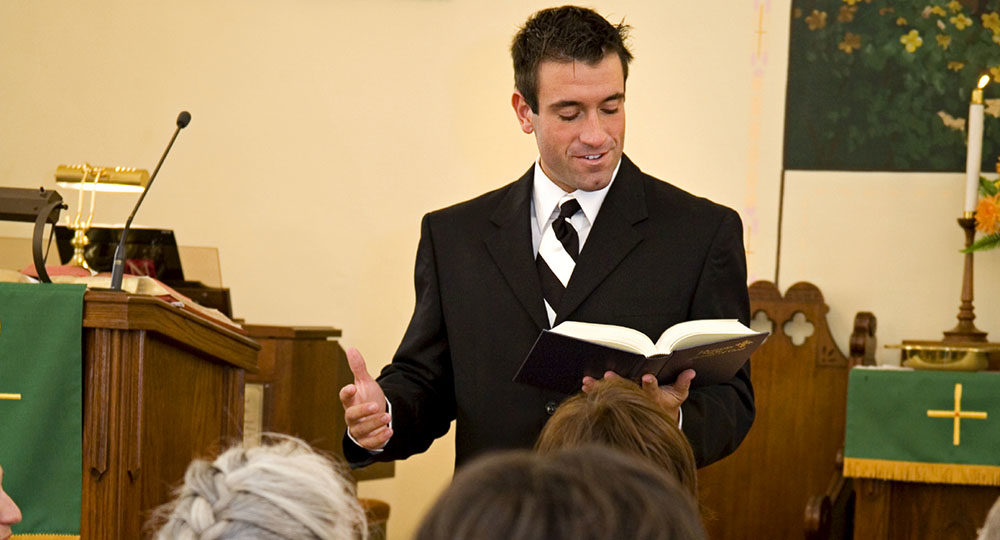How to Listen to a Sermon
Take off your shoes, please,” my Asian friend warned. I was preparing to step onto the stage to preach to persecuted Christians in a restricted country. The surprised look on my face cued my host to my ignorance. He explained, “The people of our churches have such respect for the Word of God that they see entering the pulpit as stepping onto holy ground. We always remove our shoes.”
I was happy to comply; and this West Virginian learned to preach in bare feet.
Ministering among those Christians, who had few resources in their language other than the Bible, humbled me. With our myriad of translations and flood of biblical resources, have we Western believers lost respect for the Holy Bible and its preaching?
Not everyone is called to preach, but everyone is called to listen. In our culture, where persecution is limited but entertainment abounds, it is easy to skip church, get bored with the Bible, or give little thought to our response to a sermon.
It is possible to assent to Scripture’s inspired inerrancy, yet fail to connect our theology to our personal attitudes about preaching. In light of what the Bible is (inspired by God, 2 Tim. 3:16) and what it does (thoroughly equips, v. 17), the apostle Paul’s last charge to his beloved protégé Timothy was, “Preach the word!” (4:2).
This powerful passage has implications for all of God’s people. Since God wants every believer to listen regularly to the public teaching of Scripture, what can we do to regain the respect and joy that listening to biblical preaching deserves?
Listen in Awe of God
Paul could not have given Timothy more serious or emphatic instruction:
I charge you therefore before God and the Lord Jesus Christ, who will judge the living and the dead at His appearing and His kingdom: Preach the word! Be ready in season and out of season. Convince, rebuke, exhort, with all longsuffering and teaching (vv. 1–2).
The term for “charge” was an emphatic form of “warn” and a solemn word from the courtroom. A preacher answers to the Judge of the universe, and the listener should realize it is God Himself speaking through a human being.
Paul praised the Thessalonians’ response to preaching: “When you received the word of God which you heard from us, you welcomed it not as the word of men, but as it is in truth, the word of God, which also effectively works in you who believe” (1 Th. 2:13).
When your pastor opens the Bible, picture him with his shoes respectfully removed, standing in the throne room of almighty God. Heaven awaits your respectful attention and worship.
Listen in Awe of God’s Word
Awe of God Himself produces awe of His Word. The phrase preach the word employs the verb “to proclaim as a herald.” The herald’s job was to announce the message loudly and clearly. He came from the king’s court; and listeners were held accountable to the king, not to the messenger.
When people object to the Bible, their real problem is with God Himself. If someone comes to me to argue against biblical truth, I simply encourage him to take it up with the Lord, the author of the Book.
Instructions to the preacher also have implications for the listeners. The fact that Pastor Timothy was told, “Be ready in season and out of season” implies God orchestrates the timing of particular sermons. Our sovereign God has a reason for your hearing a particular message at a particular time.
Since Timothy was instructed, “Convince, rebuke, exhort, with all longsuffering and teaching,” listeners should ask God to use His Word to correct errors in their lives, rebuke them when they are wrong, and also to encourage them.
The term exhort indicates coming alongside to help with whatever is needed—encouragement, comfort, counsel, admonition, etc. God can supernaturally use His Word to provide each of these things to multiple individuals through the same sermon. The Holy Spirit, who is called “the Helper” (Jn. 15:26), accomplishes this feat because He comes alongside as the Word is proclaimed.
Believers always need the preacher’s patient “teaching” so that they are constantly learning more of God’s truth and being reminded of truths they have forgotten.
We need the awe of God’s Word as described in Isaiah 66:2: “Says the Lᴏʀᴅ, ‘But on this one will I look: on him who is poor and of a contrite spirit, and who trembles at My word.’”
On your way to hear a sermon, ask God to speak to you personally. Tell Him you will seek to obey whatever He says. You likely will never hear God’s voice from a burning bush; but wherever His Word is preached, the ground is holy.
Listen While Avoiding Distractions
Paul’s prediction has never been truer:
For the time will come when they will not endure sound doctrine, but according to their own desires, because they have itching ears, they will heap up for themselves teachers; and they will turn their ears away from the truth and be turned aside to fables (2 Tim. 4:3–4).
We live in a more distracted generation than perhaps any in history. Rather than hunger for the healthy meat of the Word that nourishes their souls, people with itching ears (they want to hear what they want to hear) seek spiritual junk food. And that junk food is readily available.
They shop around for a preacher who tells them what they want to hear or who is entertaining. As a result, they are distracted from God’s truth and end up believing the lies or half-truths (“fables, myths”) of our culture. If you minimize Scripture, you are vulnerable to any deception.
Appreciate God’s Servant and Pray for Him
Paul’s instructions to Timothy provide an effective way to pray for your pastor (v. 5). Pray he will be mentally and spiritually alert, willing to suffer, effective in sharing the gospel, and faithful to carry out the full requirements of His God-given ministry.
A seminary professor recently asked aspiring pastors in his class which preachers had impacted them the most. They named many well-known writers and radio or television speakers. None of them named their home pastor or the preacher they listen to on Sundays. What a shame! A pastor you appreciate and pray for will make more of an impact in your life.
The words that emanate from pulpits weekly are greatly underestimated and often diminished by preacher and listener alike. But, Jesus warned, “Take heed how you hear” (Lk. 8:18).
Does your attitude toward biblical preaching show that you realize your pastor is standing on holy ground? Perhaps we all should take off our shoes, so to speak, when we prepare to hear God’s Word.






